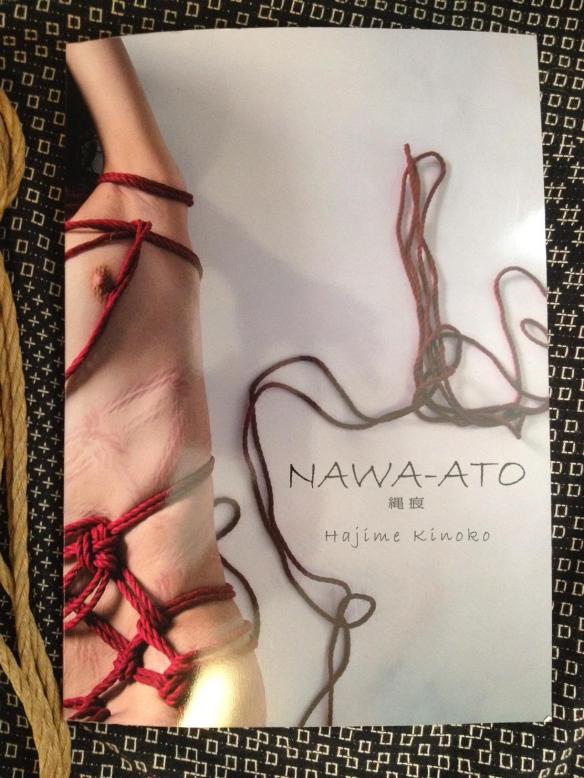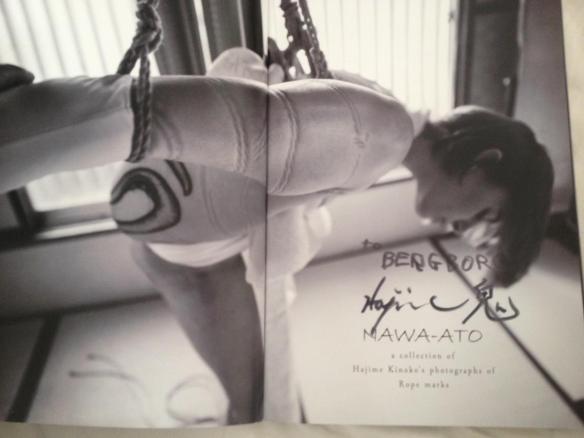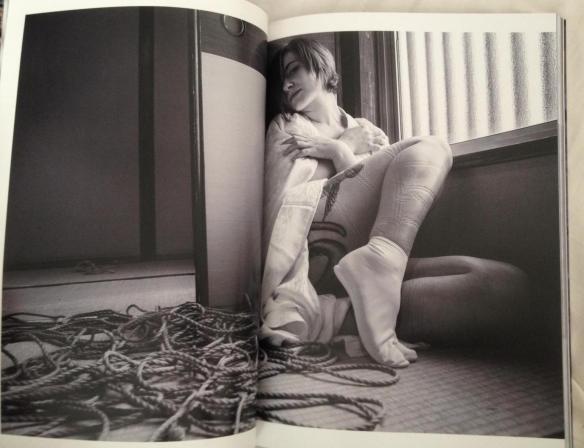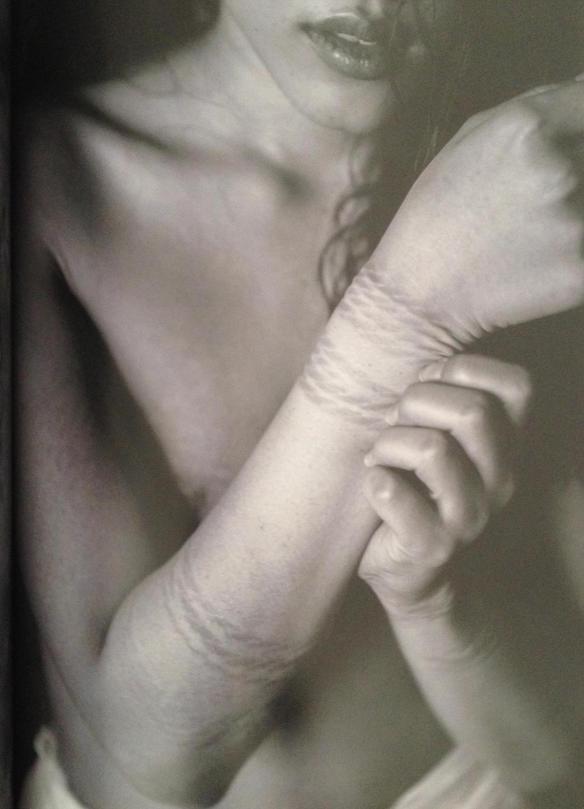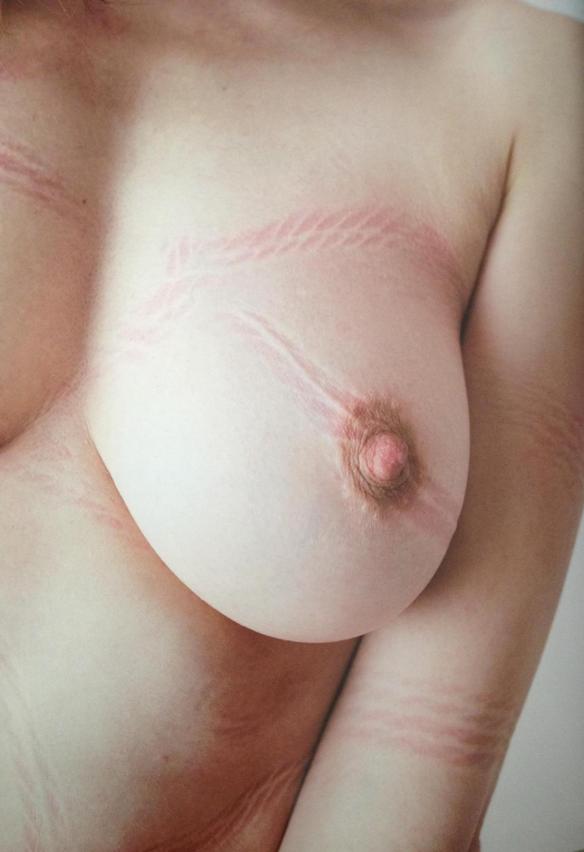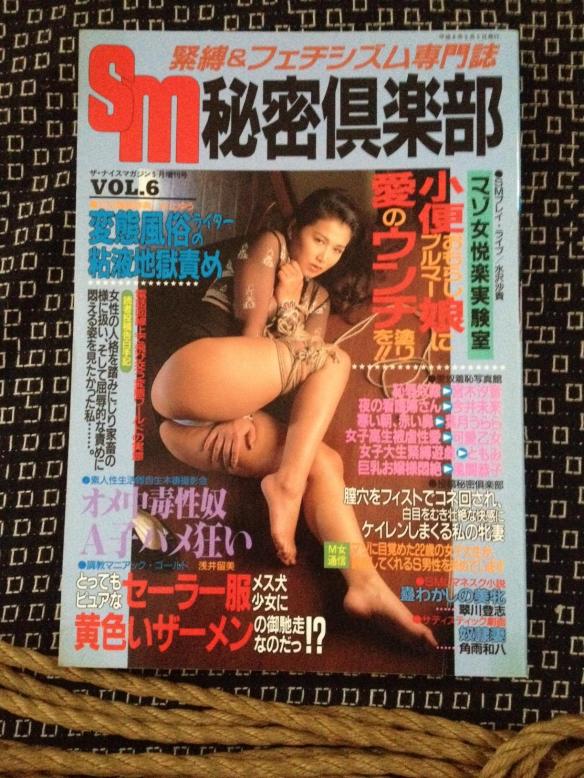
Akechi Denki: Interview in SM Secret Club (1997)
In 1997, the magazine SM秘密俱楽部 (SM Secret Club) published an in-depth interview with Akechi Denki.
In 2009, NuitdeTokyo made a translation into English of this interview for Osada Steve’s website TokyoBound: [ http://www.tokyobound.com/blog/?p=245 ]
I have been looking for this magazine for quite some time, and recently was able to get my hands on it and add it to my collection.
I asked NuitdeTokyo and Osada Steve for permission to republish the translation of the interview here on the KinbakuBooks blog, which they generously allowed me to.
Thank you!
***
Introduction from TokyoBound
The following interview is from volume 6 of SM 秘密俱楽部 (SM Secret Club) published in 1997. It used to be a relatively minor player within the Tsukasa Shobo Publishing portfolio – ranking behind magazine titles like SM Fan and SM Frontier, that left their mark on Showa era SM publishing.
After a messy change of ownership, Tsukasa Shobo went bankrupt in 2007. The interviewer for the article signs as Tajima Osamu, a fairly common name. An internet search hasn’t come up with any other SM-related works under that name.
Interestingly enough, the article includes mention of Osada Seminar pioneered by Osada Eikichi .
Thanks to NuitdeTokyo (NdT for short) we can bring you now the English translation of this interview. Next to Master K, NdT is probably the most avid collector of Japanese SM literature. In the past, NdT has discovered another Akechi Denki interview (from ca. 1976) and kindly shared it with us here.
For those unfamiliar with the who’s who’s of the Japanese Shibari and Kinbaku world, both Osada Eikichi (長田英吉) and Akechi Denki (明智伝鬼) are considered grandmasters of the art – the former having passed away in 2001, the latter in 2005. The probably last ever interview with Akechi Denki Shi was conducted by Osada Steve (長田スティーブ) for Steve’s own magazine, Fetish Japan, and for SM Sniper, one of the largest surviving SM magazine players, until it folded in January 2009.
Before we now get to the actual story, a few words by NuitdeTokyo:
Throughout the translation I have used the word ‘fetish’ for what the Japanese like to call ‘mania’ because I feel the present usage of the word in Japanese is closer to ‘fetish’ than to ‘mania(c)’. I have also added some notes inside the text (indicated by NdT). The original article also had notes, but I have incorporated their contents in the main corpus.
***
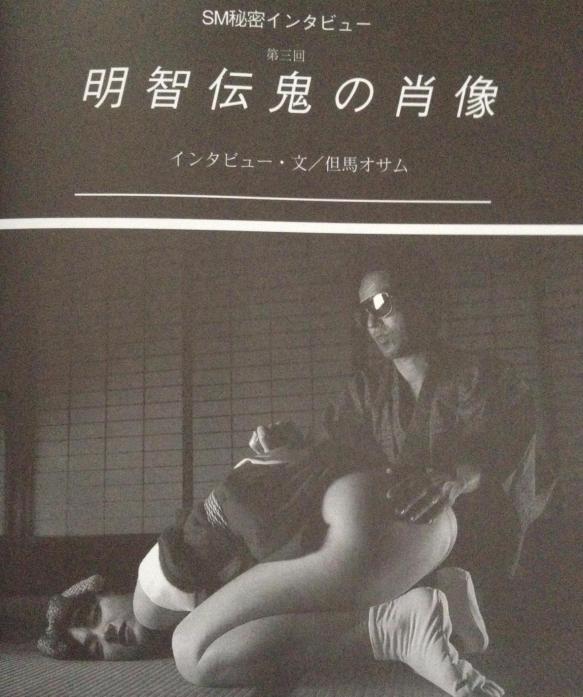
Akechi Denki interviewed by Tajima Osamu, in ”SM Secret Club” (1997)
The first magazine specializing in SM and hentai [pervert] material was the highly regarded Kitan Clubwhich started in 1948. Its long-time editor was the legendary Minomura Ko [NdT: please refer to Master K’s excellent book The Beauty of Kinbaku for additional information] who contributed in several ways to this special publication. Alongside with him, many people – some famous, others not – may be called the first generation of post-war Japanese SM. Akechi Denki may then be called part of the second generation.
The first generation was strongly influenced by the war. For example, an enemy ship sank Minomura Ko’s ship and he was left adrift in the Pacific Ocean for many days. It was then, where he promised himself that if he ever made it back alive, “from now on, I will do the things I like”. Also, the author has directly met someone who was working in China as a spy for the communist guerilla, was arrested by the army and subjected to unspeakable torture. The spirit of resistance he nurtured in these conditions blossomed into non-orthodox eroticism. These are people who “have seen” the space between life and death. When compared to the “young” people entering SM from the fashion side, there is a rather wide generation gap.
For the second generation, death was a rare encounter, a seldom seen acquaintance. But obviously, hunger and starvation were there . . .
“At primary school, several levels were crammed into one classroom. When it was time to eat, several students were customarily left alone, as they did not bring a lunch box; they had to do with a glass of water. As for me, it was mainly just rice with a pickled prune on top, but I saw several students in my school year die. At that time, it was nothing strange.”
The family of Akechi Shi was a well-respected family of craftsmen. Thanks to that, its environment was comparatively privileged. But at this time, the term of “war” could still be applied to a food supply situation, which, in an unseen way, was gnawing away at the developing bodies of the young generation. So, several times, Akechi Shi was suspended between life and death. At the same time, as we shall see later, his family was getting closer to financial ruin.
“At the time I was growing. I had an extremely strong interest in the body of women. I had this girl next door to whom I had been close since kindergarten. Together we often played doctor. The fact she did not have a male sex was very strange, as if it had been reduced to a pebble. I did some fairly wild things. After that I was very much attracted to the female bottom. I often peeped into the toilets from the small windows there. I knew in detail all the neighboring public toilets.” (laughs)
While Akechi Shi was already showing in his young years a good deal of lusty curiosity, the encounter with the magazine Kitan Clubtook place while he was in his third year of primary school.
“When I saw this at the old book seller next door, it was an experience I would remember all my life. Flipping the pages, I could see women being tied up, ill-treated, it was shock strong enough to burn my body. As I was clinching my pocket money to purchase the magazine, the shop owner barked at me, “This is not something for kids. What is your name?” and I was forced to write my name and my address (laugh). I was distressed for a moment, and thought of several strategies. A shop close by was not good. And I contemplated asking one of my uncles. Finally, I grabbed my bicycle and went to a book rental shop in the next town and rented a copy of Kitan Club without getting any remark from the shop owner. As soon as I got out of the shop, I started on my bike as fast as I could.”
The young first-time reader of Kitan Club matured rapidly and his first hands-on bondage was in his second year of junior high school. His partner was a younger girl who was living close to the family home of his mother.
“As we had a good relationship, until the third year of junior high school we used to take our bath together. We would play doctor. I would tie her up and make her roll on the ground. But once, we were surprised by her parents and they started chasing me (laugh).”
Be it with a classmate in kindergarten, or with a childhood friend, it appears that Akechi Shi was a “special person” since the youngest of age.
For people who are into fetish, they are doing it as a strictly personal thing, not even disclosing it to their wife or girl friend, and feeling frustrated, can only envy such an early development. Akechi Shi probably has a special gift for attracting women. Even when only doing an interview, this is something you can feel. The black sunglasses, the clothes, very often black, are not a mere show. There are also no complicated conceptual words to try to throw a cloud of smoke at the listener. Akechi Shi tells in a soft voice of its past hard times, stories, which would normally cause people to get very tense. These stories are so interesting that they draw strongly the attention of the listener.
When reading the stories in Ladies Magazine [at that time, Akechi Shi was running a series where average female readers would volunteer to have a first-time SM experience and be tied up], one can only empathize with the amateur volunteer who says, “If it is him, I will let him use my body as he wishes”.
“In SM there is a relation of trust. If the partner does not fully entrust her body with a complete peace of mind that is when accidents do occur. When I am performing shows, I tie rather hard. Of course, I attach the utmost importance to the limits of the partner. As soon as it is finished, I softly embrace the partner while telling her something like “you have been very courageous”. At that time, the thread of the kinbaku snaps, and the model, while shedding big tears, nestles herself against me. At this time, the girl’s expression is really cute.”
Upon hearing this, one can catch a glimpse of the stance of Akechi Shi towards women.
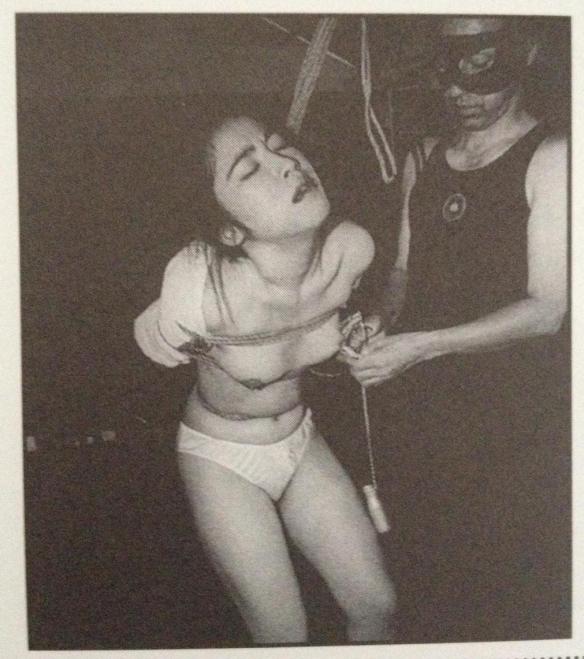
When Akechi Shi was in high school, he tried to join the Kendo club of the school but was refused after taking a medical check-up. The rheumatic fever he contracted when he was young was not completely cured. Upon reflection, it was a bad omen.
At the same time, the businesses his father was involved in failed completely and his father disappeared. The house was mortgaged and in fact the entire family was dispersed. Akechi Shi himself was forced to enter into apprenticeship as a house builder. At that time, apprenticeship really meant living as a domestic in the house of the tradesman.
“As we were living in, we had to wake up at 6 am. The atmosphere was a bit like being sent to jail. Of course, it was out of the question to even touch the tools. It was really learning by watching only.”
In the construction business, bullying and bad treatments were also the norm. Up to now there is a scar on the back of Akechi Shi’s right hand, the result of a saw strike by a sempai.
Then, suddenly, when he was 19 he suffered a heart attack. The initial rheumatic fever had left his cardiac valves constricted, which meant that blood was sometimes flowing in reverse direction into the lungs, possibly leading to death.
“When I was told by the doctor that I was not very likely to live beyond thirty years, it all became black in front of my eyes. But being sad would not serve any purpose. I had two younger sisters, which had been entrusted to different relatives. From time to time, I received some letters, there was no explicit mention of loneliness or of things being hard, but one could feel it from the general tone of the letters. And I promised to myself to get again a house where all the family members could live together. If I lived each day with double intensity, even though I may die when I am 30, it would be the same as dying when I was sixty. Very simply, the trick was not to sleep.”
So, he worked while allowing his suffering body only 3 hours of sleep every day. He had to learn his work faster than the others. Soon he turned independent, recruited some available workers, and he became himself manager and bookkeeper. At the top, he had more than 100 employees and before he was 30 he managed to build his own house and bring back his mother, his sisters and even his father.
It was at that time that the SM desires started burning again. Using his worn body as an experiment machine, he furthered his studies of shibari by observing and copying.
When doing shibari, where does the weight of the body creates a tension? In Ebi Shibari, up to where can one bend the body? When doing shibari with rubber bands and you want to test the limits, how long can you leave them in place? All this he managed to understand. “I also did tsuri, I also probably did some absurd shibari patterns. I remember that tying oneself creates a strange feeling of psychological intoxication. As such, I think the S and M are two sides of a single entity.”
“Late at night, when the work place was deserted, I also managed to convince a girl working for the company to let herself be tied. As my heart was bad, I was always wearing a sarashi [a roll of white cotton cloth wrapped around the chest] under my clothes. I took it off and used it to tie up the girl (laugh), as the workplace was often a shop or a department store, we used to roam naked among the counters and the mannequins. I devised quite a number of ‘plays’ at that time. Even for the owner of a business, seducing an employee, because of the future consequences did require a certain amount of boldness. I obtained a good understanding of kinbaku.”
Certainly, there is a special mood when Akechi Shi is holding a woman close to his chest. More importantly, for him, at that time, there was no ‘future consequences’.
“Anyway, I kept thinking that I had only 10 years to live. As for me a girlfriend was someone who accepted to die with me. I was only getting 3–4 hours of sleep per week going for long drives with my girlfriend in the middle of the night. Kissing while driving at mad speed along the edge of a cliff. This is one way of trying one’s luck. I was not sure whether this girl would go along. But after, she slipped in the space under the steering wheel to suck my cock while I was driving. While I was getting a blowjob, sleepiness overwhelmed me and before I realized it, I had bumped into a village house. We were both completely naked (laugh).”
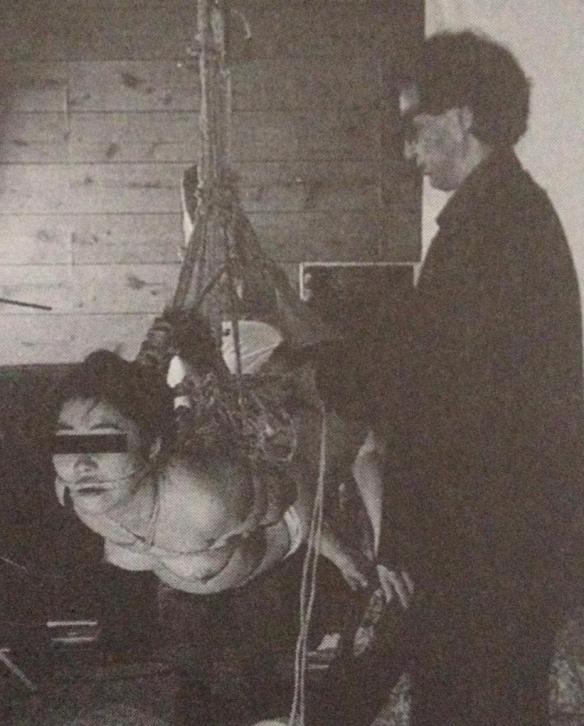
Apart from work and SM another thing was absorbing his attention: billiard. Akechi Shi was playing as a professional gambler and hustler. People were betting like on players the way they bet on horse racing. In that world every evening, tens of thousands of dollars would change hands. If you lose probably someone will squash your hands.
“I had this guy, wearing a soft hat and a muffler, who looked as if he would give you some amphetamine to liven up the atmosphere. As he would be overtaken by sheer energy of the opponent used to increase his concentration power by training bare feet after having spread ice on the ground below the billiard table.”
In fact it was a real world that looked like a movie. Today, billiard is considered a sport. At that time it was supposed to be a gambling activity with a strong scent of underground. “Somehow, it was close to SM,” says Akechi Shi with a wry smile.
Just at that time, Japan entered into its period of high growth. Akechi Shi spent his third decade living at double or treble speed. But this way of living finally exerted its toll.
“As I turned 30, I started spitting blood and was taken to the hospital.”
But when he was fully resting in the hospital, unknown to him, a lot of things were happening. His father who had taken over the management of the company after his son was hospitalized started to quarrel with the employees. Akechi Shi was already married for the first time, but at that time the bad relationship between his wife and his mother and father became apparent. And simultaneously, the business of the company started to turn bad.
“The employees came to the hospital and protested that they could not work under that guy (my father). My father protested. The debts started to accumulate. My wife was crying. Although I was not supposed to receive visitors, there was mayhem around my bed. In the end, my wife left my newborn child in my hospital room and disappeared.”
“I felt obliged to do something which was really beyond my strength at the time; and tottering like a sleep walker, I wandered in the middle of the night around the hospital. Also at that time, I often went through near death experiences. I was floating close to the ceiling of the room. I could even see the top of the heads of the family members in the room.”
Finally through a miracle performed by a very good heart surgeon, Akechi Shi managed to recover. But upon leaving the hospital, his company was bankrupt, he had to relinquish the home he had built.
“My father had again in a hurry entered into dubious speculations. I asked him if he wanted again the family to be dispersed and I started to hit him. But my father, normally stubborn and with strong arms, collapsed on the floor and covered in dirt started to cry. Seeing this I also started to cry. It is only a house. We shall build another one, let’s not worry.”
Akechi Shi stirred himself back into action. It was then the second half of the seventies and at that time he made a fateful encounter.
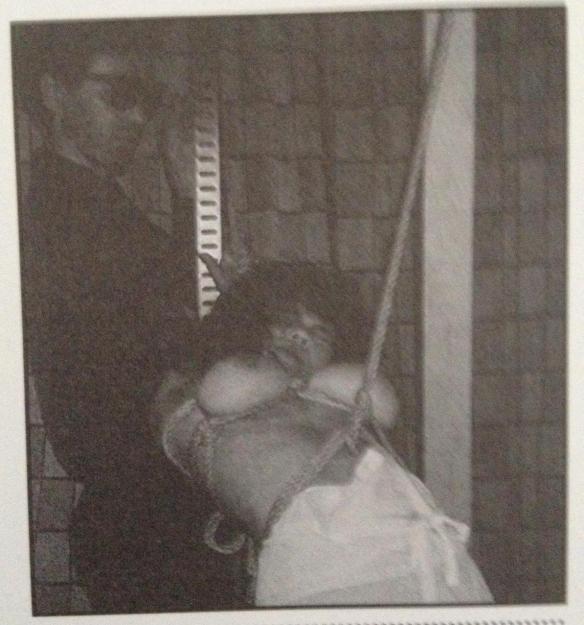
Sakurada Denjiro, who was at the time leading an underground theater group named Sekai Gekijo [Theater of the World] had just established GSG Planning to organize SM shows. The year was 1978. Sakurada was a frequent visitor of OSada Seminar, but in terms of SM, he was really an amateur. In short, he was collecting huge amounts of money by enticing people to come and watch a show that was little more than scandalous theater. Seeing this, Akechi Shi was utterly disappointed.
“It was really a bluff. It was only a substitute which could not satisfy people looking for the real thing. At the end of the show I manage to talk to Sakurada. ‘What you are doing is no good,’ I told him. I even sent him a whole bunch of Kitan Club back issues. One thing leading to the other, I ended up joining his theater group as a Shibarishi or supervisor.”
Contrary to expectation, underground theater and SM have an unexpected affinity. Terayama Shuji [head of the underground theater group Tenjosajiki (The Upper Gallery)] used to say that theater is a machine for “physical self-punishment”. In 1970 at the launch party of Kachikujin Yapoo [Yapoo: The Human Cattle] the members of his Tenjosajikigroup staged an SM show [NdT: Kachikujin Yapoo is a very famous anticipation SM novel looking at things from the male sub point of view. Written by Numa Shozo, it was originally published as a series in Kitan Club between 1957 and 1959 and was praised by Mishima Yukio. The first book edition took place in 1970 due to censorship issues and the article refers to the launch party of that edition. There was a French translation in 2007, which received the Sade literary prize in Paris. ISBN 978-2268055664 for volume 1/3. I am not aware of English versions although the book is widely referenced by scholars of Japanese subculture. The term Yapoo has become widely used especially by makers of male sub movies.] Many theater groups also included female actors in gyaku-tsuriand suffering physical punishment as a means of creating performances with a strong visual impact. The Scandalous Theater Group led by Tamai was also one the groups specializing in SM performances. In terms of subculture, it was not, in itself, very surprising that underground theater groups were feeling close to SM as the “front line of sexuality”.
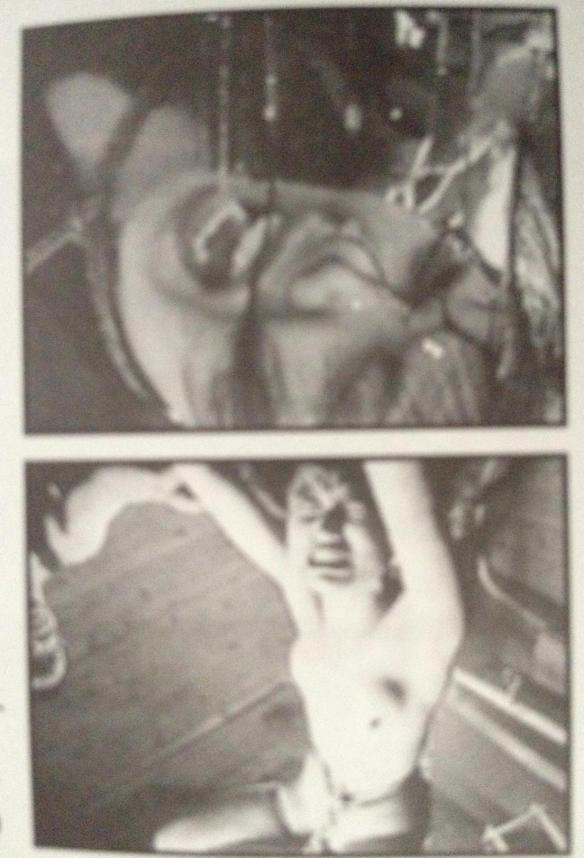
CSG Planningeagerly introduced many of the plays that Akechi Denki had been imagining over the years. Progressively what had been a secondary project became the main focus. The evenings where, after the theater show, a real shibari show was taking place were very well attended. They became the selling point of CSG shows, starting a tradition that continued until today with Akechi Shi live shows. At the same time, Akechi Shi finally adopted the Akechi Denki name.
“To tie up the very popular actress Kurokawa Mayumi was a really good occasion. She said she really had no M/sub tendencies at all. She was really good looking. As for the shibari part of the shows they did not really have a fixed program, it was more like an ad-lib improvisation based on the feeling of the place, a show where the tying was really constructed live. To show a different tie every time is really, really difficult. But if you feel like doing it, it is really enjoyable,” explains Akechi Shi, reminiscing on his time with CSG Planning.
After the CSG period, Akechi Shi mainly appeared at Tokyo SM, SM Bomber,and SM Suizokan [SM Aquarium]. [These three series of shows resulted from a split of CSG planning.] Among those, the extraordinary performances organized by SM Bomber are still being talked about in fetish circles. There was also an obvious friendship between all these related groups, and Akechi Shi was sometimes invited as a joint guest performer and he could display some rope action of which he was rather proud. In other words, Akechi Shi continued to display energy three times as high as a normal human being, and, given the occasion, he would aggressively deepen his affinity for the fetish world. This is probably a better way of looking at things. Among the fetish people (without limiting oneself to SM) there is often a certain difficulty to act and a feeling of being bottled up which was not at all apparent with Akechi Shi.
If CSG Planning was what made him become Akechi Denki, SM Bomber is the place where he developed and polished his skills.
SM Bomberdissolved itself after 2 years and Akechi Shi could not avoid a quiet period for a short while. But the fans he had accumulated since the time of CSG did not stop there.
“At the time of CSG Planning, there was an Association of the Special Members which was a kind of circle devoted to fetish performances and I took over the duties of that circle. The circle members told me, ‘Please start your activities again,’ and this was the start of the Akechi Denki Kinbaku Photography Club. By the way, many of the members were not so young and could not attend so easily, or had relocated, and there were many setbacks on the budget side. Intended as a way of getting new members and doing live shows again, the Phantom Show was started in 1987. It is the predecessor to the present [NdT: in 1996 when the article was written] Studio Phantom. During the Phantom Shows, I did a number of tsuri-otosu [吊り落とす, suspension drops] which consist in letting the model drop like a stone from a tsurito within a few inches off the ground. When falling, the koshi-nawa bites sharply. When you look at it, it is very impressive. But if you make a mistake, the woman’s head will hit the ground and you have a big accident. The technique requires good timing and full control of the rope tension and not many people can attempt it. There were also times when I would throw bits of concrete at the tied model so she could just dodge them at the last second. The fear-frozen look of the model and the open mouths of the surprised spectators was something I had never enough of. Maybe I went sometimes too far (laugh).”
Although CSG Planningdid close, Akechi Shi did not lose any of his boldness. Right now [i.e. 1996], Akechi Denki and Studio Phantomare doing shows in the well-known SM club called Nakano Queen [NdT: the space still exists today in 2009]. In addition, Akechi Shi is managing five other circles and also takes part in numerous films and videos.
“One of the projects is a collaboration between SM and Noh [NdT: the traditional Japanese mask theater form]. The aim is to show the beauty of Kinbaku in the context of Noh dance. Of course it is a fantasy, as I will not be able to rent the Tokyo National Theater to show my SM, so I have to find a method to make it work. It is still a secret. Please come and see the show.” [NdT: we are not sure to what show Akechi Shi is alluding in that passage.]
Akechi Shi has in the past done joint shows with a pianist. And one can think that those joint performances with a feeling of remix are contributing to open up and expose the possibilities of SM. So we will wish Akechi Shi all the success in his venture.

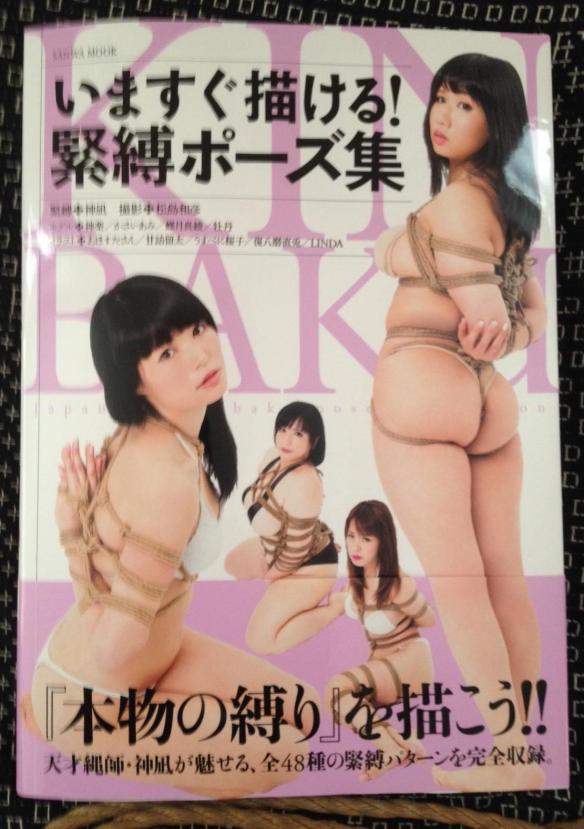
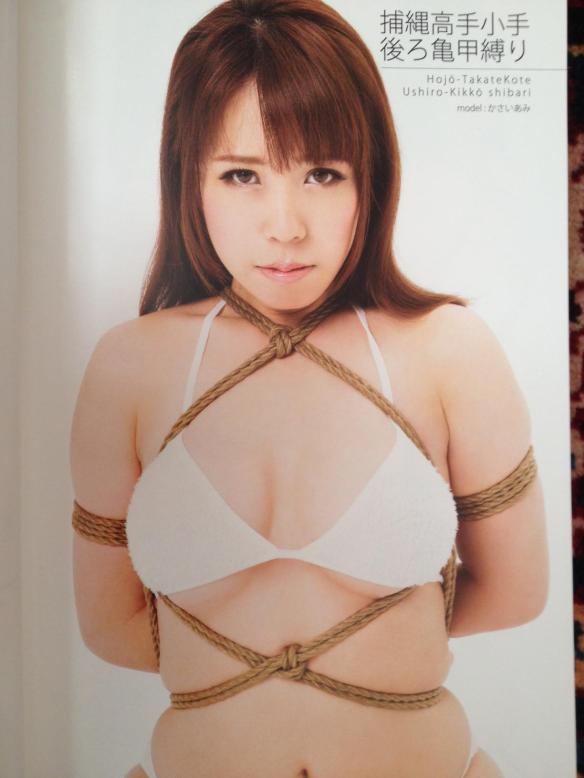
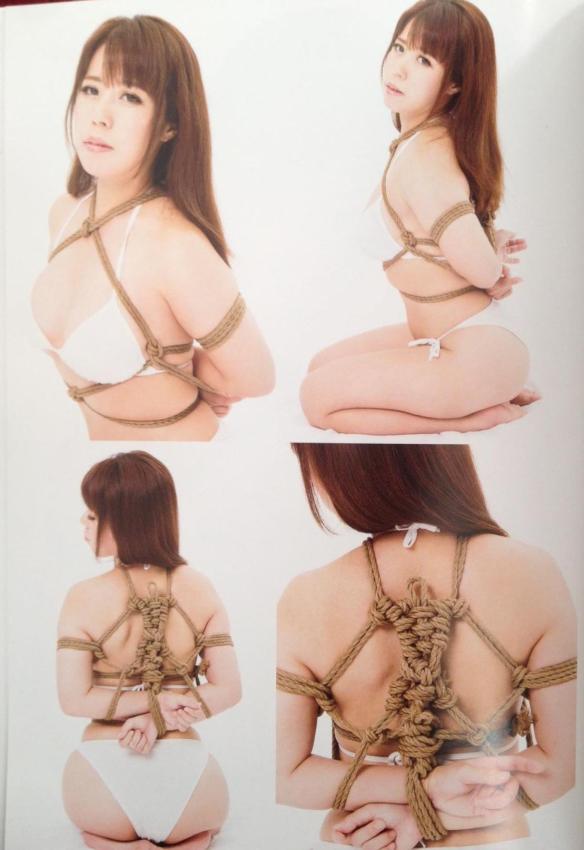
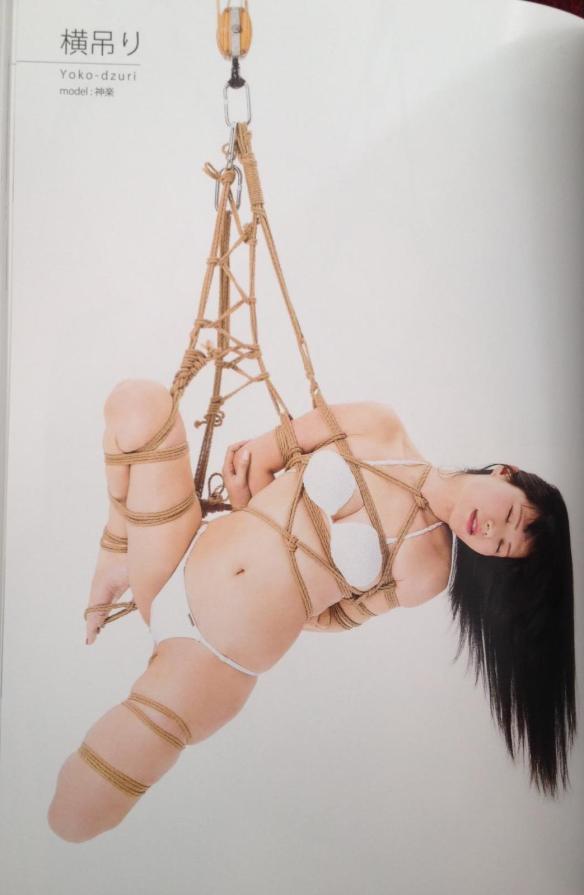
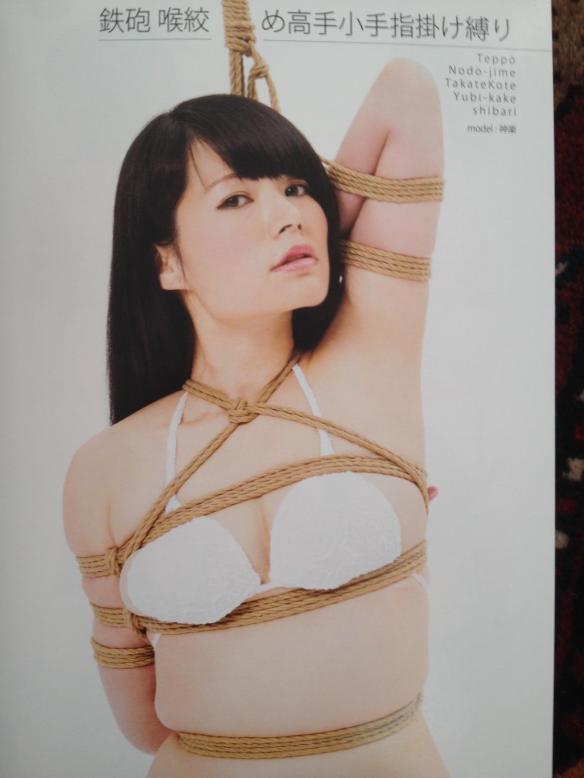
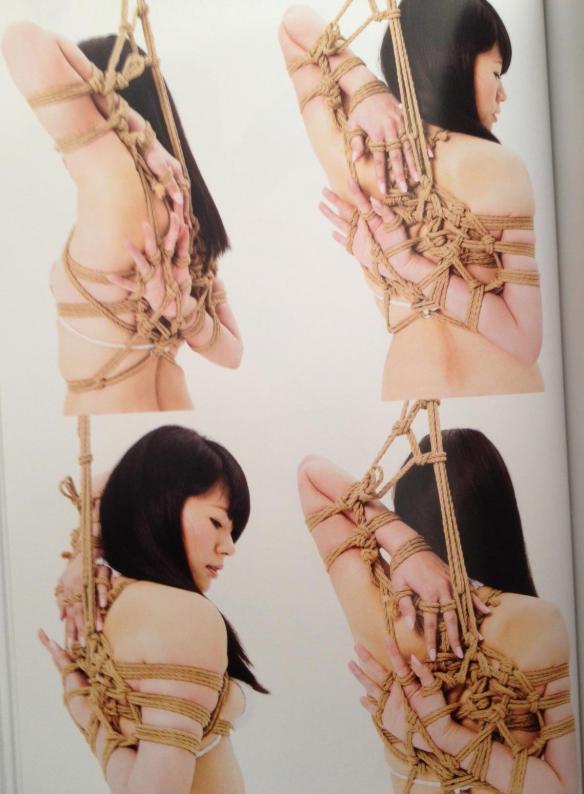
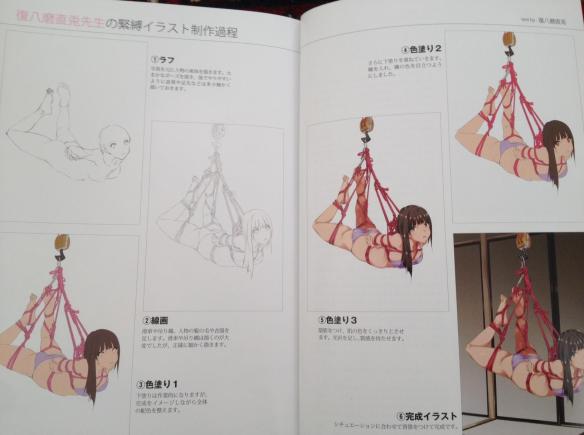 Kanna: いますぐ描ける! 緊縛ポーズ集 (2018)
Kanna: いますぐ描ける! 緊縛ポーズ集 (2018)